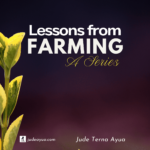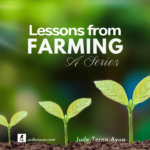By Jude Ayua
The Unprofitability of the Lord’s Vineyard
The earlier parts of this series focused on lessons from the song of God’s beloved and his vineyard and how they apply to our lives and purpose. Particular references were made to spirituality, relationship, marriage, and career.
In the song, notwithstanding the work the planter did for his vineyard, something disappointing happened: “…he looked for a crop of good grapes, but it yielded only bad fruit.” Because of the vineyard’s failure to yield fruits, the planter decided to destroy it. Isaiah 5:3-7. Naturally, it is expected that a plant that is in a favourable environment, supplied with the right nutrients, and protected from all forms of attacks, should produce good fruits. If it fails, it means something must have gone wrong.
God describes the vineyard in His song as the people of Israel. He lamented because He had expected the people to bear fruits of righteousness, but instead, they bore evil fruits, despite His heavy investment in them. God decided to withdraw His protection from the people, break down their wall, and stop caring for them. He decided to expose the people to attack from other nations, stop rain in their land, and abandon them.
Sometimes your investment could go wrong, despite your efforts. You may give it your best time, attention, and resources, but it may not yield as you expect[ed] it to. As in the song of the Lord’s Vineyard, you, as a planter, must decide what to do about your vineyard when it turns out unprofitable. You must also know when to act. If your investment in anything is not worth it, you should not continue wasting your time, efforts, and resources on it. Know when to end a relationship, change a career, or other commitments.
On the other hand, in the case of something you cannot end, such as your own life, know when to retrace your steps, reflect on the challenges, and consider possible ways forward. You may need to change your strategy, as you cannot continue to do one thing consistently and expect a different outcome.
Another area to apply the lessons in the song of the Lord’s Vineyard is in your relationship with God. In this case, you should see yourself as the vineyard and God as the planter. You should be willing to bear fruits that please God, as He has invested His graces in you. Think about what God did to His vineyard when He went to search for good fruits on it but found only bad ones. You should not suffer such consequences because you fail to produce good fruits in your life.
In Galatians 5:22-23, Apostle Paul describes the kind of fruits God expects you to produce: “the fruit of the Spirit.” Paul also explains the reward for bearing the fruit of the Spirit and the consequences of not bearing it. You are God’s vineyard and He has planted the Holy Spirit in you. You must bear good fruits to enjoy God’s reward.
This part marks the conclusion of the reflections on the song of the Lord’s Vineyard (Isaiah 5:1-7). Subsequent parts of the series will share lessons from other scriptures relating to farming. Thank you for following this series to this part. I hope it has impacted you. You can share your thoughts directly with the author here.







